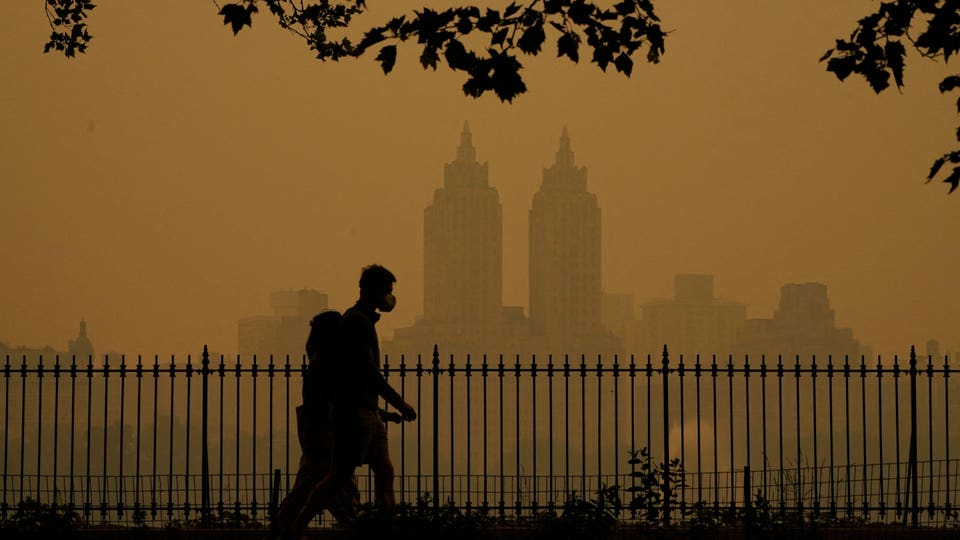Topline People living in parts of the United States with high levels of air pollution—especially in areas where pollution stems from agriculture and wildfires—have a greater risk of developing dementia, a study released Monday found, the latest study suggesting cognitive aging could be improved with tighter limits on air pollution.
People walk in Central Park as smoke from wildfires in Canada cause hazy conditions in New York City … [+] on June 7, 2023. Fine particulate matter is widely understood to be a health hazard, leading to lung and heart issues for people who live near major highways or are exposed to wildfire smoke. (Photo by TIMOTHY A. CLARY / AFP) (Photo by TIMOTHY A. CLARY/AFP via Getty Images)
AFP via Getty Images Key Facts Some 15% of almost 28,000 older adults who participated in the study from 1998 to 2016 developed dementia within a 10-year period—and participants who did develop dementia were more likely to be non-white, have a less formal education and live with higher particulate matter around their homes.
Researchers looked at survey data that asked about subjects’ cognition, health and health behaviors every two years, and gathered air quality data from the Environmental Protection Agency and information on factors like nearby transit and population density to estimate the total PM2.5—or fine particulate matter—at the subjects’ locations.
Though the researchers said the study suggests that “interventions to reduce pollution exposure” could decrease the life-long risk of dementia, they do say more research is needed to confirm the relationship between pollution and dementia.
Crucial Quote “Our cohort study suggests that reducing PM2.5 and perhaps selectively targeting certain sources for policy interventions might be effective strategies to reduce the burden of dementia at the population level, although more research is needed to confirm our findings,” read the paper, published in the Journal of the American Medical Association.
Surprising Fact Although agriculture and open fires had the strongest associations with air pollution-related dementia, other kinds of pollution had ties, as well. The study found that “road traffic, non-road traffic, and coal combustion for energy production and industry” also related to people developing incident dementia.
Big Number 188,000. That’s how many new cases of dementia annually the authors determined were attributable to particulate matter exposure in the U.S. Currently, it’s estimated that about 5.8 million people in the country have Alzheimer’s disease and other dementias, the U.S. Centers for Disease Control and Prevention said.
Key Background This study, which came from researchers at the University of Michigan and Boston University School of Public Health, isn’t the first to find a connection between pollution and dementia. A 2016 Canadian study found that people who lived nearby a major road were 7% more likely to develop dementia than those who lived further away with less particulate matter, and an English study found that adults who lived with the highest concentration of air pollution had 1.4 times the dementia risk as those who lived with the lowest annual concentration, CNN reported. Even earlier this year, an analysis out of Harvard University found that exposure to fine particulate pollutants could increase the risk of developing dementia. Fine particulate matter is widely understood to be a health hazard, leading to lung and heart issues for people who live near major highways or are exposed to wildfire smoke.
Further ReadingCNNLiving with air pollution, especially from wildfires or agriculture, raises risk of dementia, US study finds | CNNNational Institutes of Health (NIH)Air pollution from different emission sources is associated with incident dementia

